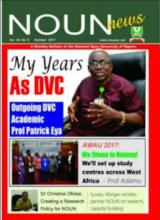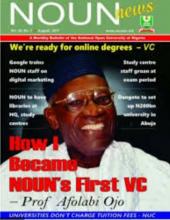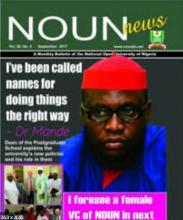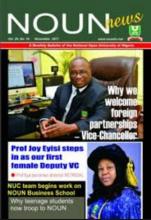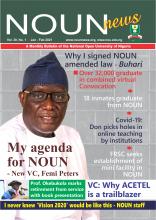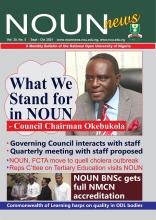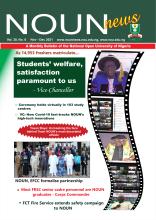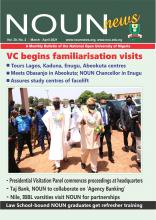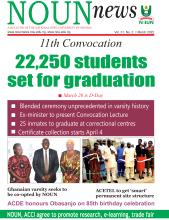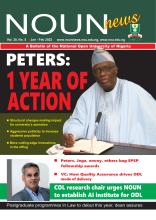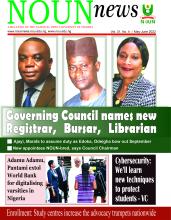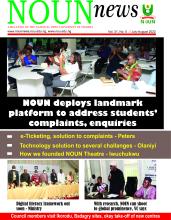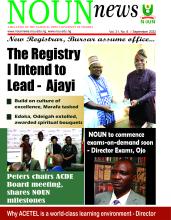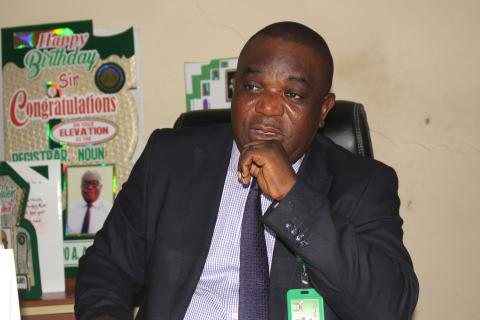
Mr. Adetayo Oladipo Ajayi was the Ag. Director, Academic Registry before his appointment as the 4th Registrar of the university by the Governing Council. A seasoned administrator, with about two decades experience in university administration, the new registrar has traversed all the registry offices on the way of reaching its apex. And having assumed office on September 5, 2022, the soft-spoken registrar laid bare his plans, visions, programmes, how he intend to re-jig the registry section as well as the open-door policy of his stewardship during an exclusive interview with NOUN News correspondents Debbie Nduba and Ibrahim Kabiru Sule. He also underlined his intent to move forward the university from where his predecessor, Mr. Felix Edoka, stopped. Excerpts:
The Governing Council of the university, after its 69 Regular Meeting held in Lagos, approved your appointment as the Registrar, which was conveyed to you in a letter dated June 27, 2022 for a single term of 5 years. In a nutshell, who is Adetayo Oladipo Ajayi?
I was born in Ibadan, Oyo State, in the early 70s, I went to Cocoa Research Institute of Nigeria (CRIN Staff Nursery and Primary School) in Ibadan. I went to Methodist High School. I didn't finish there, my parents relocated and I finished my secondary school in Oyo Town, Oyo State. Then, I went to University of Ibadan. All the while I wanted to read Law, but you know the situation of things there, not that I was not doing well but short of one or two points there, but then I proceeded for a combined honours, Political Science and Philosophy and I graduated with 2:1 in January 1998 from the University of Ibadan (UI). I went back to UI for my Master's degree in Managerial Psychology and I finished in 2005. I am a certified member of CIPM and I have a Diploma in Human Resources Management. Then, for my administrative career, for now I have 20 years of unbroken record in university administration. I started with Bowen University, Iwo, Oyo State in July 2nd 2002 as an Admin Officer II. I was there till November, 2015 when I moved to Ajayi-Crowther University as an Assistant Registrar. I left Ajayi Crowther, Oyo State in September, 2008 and joined NOUN on 2nd October, 2008 as a Senior Assistant Registrar. Then I was posted to HR Unit and I was there for more than five years as SAR HR. Then, when HR was divided into two (Junior and Senior Sections), I was the pioneer Head of Junior Staff Section as a PAR. After sometimes, I was moved to Advancement Unit under the VC office, that was in 2015. I had some stints in Academic Office, too, until January 2019 (when) I was posted to the Directorate of Academic Registry. So I worked with the former director, Tayo Olowola until she left to take up an appointment as a Registrar of a university. So I have been the Ag. Director of this place for more than two years. Before my posting to Directorate of Academic Registry, there was a merger between Advancement Unit and Research Administration. Prior to the establishment of the Directorate of Research under the headship of Prof. Ofulue, I was part and parcel of the people that drew the blueprint of the new directorate. So I was in the Directorate of Research and Administration and Advancement; I was responsible for the advancement section of that directorate. That has been my trajectory of my work experience till date, so in all, it's been more than 20 years of unbroken record in university administration. I have traversed every nook and crannies of registry. I have worked in Council affairs at Bowen University; I worked in Academic Office; I worked in Human Resources and presently I am working in Academic Registry. So that's my trajectory.
Four, they say, depicts stability and support and from our counting, you are the 4th Registrar since the inception of NOUN. How do you feel about that and what is your plan for NOUN in the next five years of your tenure?
It is a great honour when you look at NOUN, it is like three or four universities in one, looking at the number of staff and the number of students, it is like four universities in one. I know it's a huge task, it's just something you just have to know (that) it is not just a tea party. One is in for a serious business. but I have to thank God that my exposure, the part I have taken in getting to this position has really prepared me for the task ahead. The exposure, the discipline, the work experience, everything that you need to know; the required skills set to undertake the assignment are really in place, and I think that I have been exposed to the whole gamut of what it takes to be a registrar of a university. If you are talking about working in the Directorate of Human Resources, that, alone, is personnel management, etc and for one to work in the Directorate of Academic Registry, these are two strong areas of university administration and for one to have worked in the Council before, even if it is from another place, it really puts one in a very good stead to understand the intrigues, what is expected of one as a registrar. My vision, as you all know, the Registrar is the Chief Administrative Officer of the university, responsible to assist the VC in running the administrative aspect of the university. The chief advisor to VC on administration because every file of staff is in your custody and you are to provide advice to VC to take decisions. So it is not just limited to registry staff alone, it covers every staff of the university, you are to advise him according to rules, you have the public service rules, condition of service, government circulars, you have to be very conversant with all the instruments for you to be able to advise him accordingly. Also, Registrar is the Secretary to the Senate, and for you to be secretary of senate, you must be very fast in all the senate rules and statutes etc. Registrar is the Secretary to the Governing Council. I have personal vision and goals, but my goals and vision must be dependent on VC's vision. Yes, there is an overall vision of the university, and so our vision must be a derivative of the overall vision of the university. It must be in sync with NOUN vision and that of the VC's vision. So I have been working with some people in the past five or six weeks on how to sustain the institution; what we want to do; what we want to achieve; what we want to bring in and we have keyed in to the VC vision. The goal of VC is increase in students enrolment to one million in the next five years. That is when he assumed office in his first address. So how do we assist him to achieve this? What do we do? So, when I have vision of enrolment you see it is in sync with VC's vision. There is a report we did, at end of it, you find out that prospective students that bought our forms every semester are more than 70,000 but by the time that we are going to do matriculation, you find out that we will be matriculating 25-26,000. What happened to the remaining 50,000 and I looked at it over three semesters, it was consistent, that we are loosing about more than 40,000. Yes, they bought forms but at the end of the day, they don't matriculate, both the undergraduate and postgraduate and I asked my fellow colleagues that did the study with me, we are about four and we forwarded the report. So the question we ask ourselves: how do we do it? We arrived at having a team to be tracking it, since our admission is online. For instance, whenever admission is applied abroad once your address is being captured, they will start sending you emails. We also can do that. We will start sending email to you, we can do that, we can have enrolment officers amongst us, admin officers, study centres, we don't need to recruit. The instructional videos being produced by the university now, they can do like an overview, direct market scene about what one stands to gain if applied for a particular course. These are the things that can help in having an improved enrolment figure. Again, what about automation of what we are doing, especially the Human Resources and Academic Affairs? Yes, we are using systems but in the real sense of it, since we are human resource, this is the modern era, we should be able to apply or introduce modern ways of doing things. We are spread all over Nigeria and I believe that for staff to fill APER form on the physical form, it can equally be automated. There are so many human resources software that can be customised and built-in for NOUN to address our own practices. We have been working on that and I also have this vision that faculty offices must be strengthened. Back then in the university, for one to see a faculty officer it is not easy at all, which depicts it as a very powerful position and I want to make sure that Deputy Registrars are meant to do what they are supposed to do in the core registry functions. The highest officer in registry is the Principal Assistant Registrars. Deputy Registrar is a very powerful position, it's a management position. We are thinking they should be properly utilised so they can be seen doing the managerial roles. That is what I am thinking. I also want to continue with what we have started, having meetings, regular meetings with heads of unit, directorates, deputy registrars, faculty officers, etc. What are the problems and challenges they are facing and the necessary feedbacks so we can speak with one voice as registry so as to encourage others. We should be able to do things according to the book, according to the letter, so many things we are thinking of and I think that by the time we start, you will know that we hit the ground running right from the first day. We are working to get all these things documented and I believe that when the time comes, all these things will be officially unveiled. So, these are the things I will really like to do about the registry, especially doing things based on the rules. If you are giving something to me or rather you applied for something, I will like you to quote the relevant sections of the Public Service rules, relevant sections of Condition of Service. For example, if one applies for Maternity Leave, what does the rule says? let it be quoted, that's the way we are taught, not just talking the word of mouth. I will want the relevant sections to be quoted, that is the way I was taught about Human Resources. So that's part of my vision for the registry. A registry that will be so professionally driven, that can stand their own anywhere they are, the registry that a deputy registrar will be able to write an excellent report because that is where you can earn your respect. You must be professional in all ramifications. That is what I want to do. I want to instil that and for training, we need training. Everybody needs training, there are so many training that are on ground that have been identified and we are going to appeal to the VC, we will justify it, and I know that VC likes statistics. Once we can justify it, I know he will always listen to our demands, so many people need training and we are going to welcome that.
You have mentioned quite a lot regarding your goals; what will be your priority areas that you will start with and focus more on especially in your first year in office?
We intend to start off with staff training. When you have well-informed personnel, human resource-base, it will improve productivity. We are going to ensure that after the completion of APER form that is when the work of HR starts, it has to be analysed, because in each form you see training needs, which is to be identified by the director for each staff. So, all those training needs have to be identified as well as recommendation for the appropriate training to overcome the training gaps identified. That is exactly what I want to work on, and the outcome is that there will be improved productivity because the training has really been invested on. The second aspect has to do with the core aspect of the registry. I want to work on the automation process. I have been in senate and I have been on this desk for three years now, I have been writing senate reports and I found out that there are certain things; you know the membership, at times, changes. There are decisions that have been taken, that because you are a new member you will say that I don't know that the decision has been taken. For every minutes of senate, we have extra copies, and they are binded every year, but most members of senate, they don't have copies. It is only when they need that particular one, they will search for it and pick it on the table. This particular so was the discussed at 50 meeting in 2017, maybe that person was not a member of senate at that time. I believe that we could do something that we have a compendium of all decisions etc, like an arch book. So that once you are a member of senate, you will get a copy. It will make it being a smarter setting, and, here, we can deal with reference points unless you want to make an amendment to it based on the current situation but once you have those copies you just cite it. So having a compendium will assist us more and better. And the other thing which I said is about automation, I learnt that the software used for our salary is an HR software, it's just the financial aspect of it, you can deploy the licensed software to the registry. We already have it, just for it to be deployed and use the other aspect of it. So I want these things to be done. APER form should not be filled manually; the hard copies should be discontinued. Let it be completed online. We can work on it and that will save cost and it make decision-taking easy. We can equally improve on it, too. We cannot achieve everything as you really said but we have some key goals that we are focusing on and, I believe that they will be in tune, consistent with the vision of the university and that of the VC.
The position of registrar is like the hub of the university, do you have a kind of transformation agenda?
There is something that I learnt from the book by Robert Green, "48 Laws of Power." When you assume position, and you are trying to introduce a change or changes, you must be careful. You don't introduce changes once, you must take them one at a time. People have been coming and we have been receiving a lot of complaints, a lot of activities and I found out something that is so unique in their complaints: like I have applied for upgrading, I have applied for conversion, I want to go for my Masters programme, I have spent many years on one position, I want to move from junior to senior; the question has been so consistent and you find out that some of them do not even know the policy statement of the university about all this. What does the policy say? How many years are you supposed to spend before you can ask for conversion? What are the criteria for all this, and to tackle that, I have told my people, the team I am working with: there must be a clear-cut policy on all this so that when you are not successful, you will know that these people have been fair to me. For those who don't understand, you have been on CONTISS 6 and that's the bar, you have already had your degree, you feel that because you are on CONTISS 6 you want to move to Admin Officer II as a senior staff without knowing that it is subjected to having vacancy to recruit. Also, how many years one needs to spend on that particular position before applying for conversion? By the time we draw up all these policies, we will be educated more on the university policies. We also need to, especially the senior positions, the issue of going to DR, is also a very tough issue. So many people are due now, look at the number of PARs that are qualified to go to DR; how do we tackle that? The number of people on CONTISS 11 that are going to 13 across all departments. The question now is: when the university gets top heavy, what are you going to do, that is why it is necessary for us now to start building on those policies. Presently, for you to go for DR, you must have spent like four years. I have seen many complaints, but I want to do something that will be transparent, everybody will know it. If you are not successful, you will know why you are not, you have to make them know the rules, the criteria. For academic staff, there is a criterion for promotion. You must have certain number of points/publications, waited for a number of stipulated years, etc. It is well spelt out. In academic you assess yourself before you put yourself up, we can do the same for non-teaching staff as well.
What kind of leadership style will the NOUN Community expect and the changes you're bringing to the system?
Yes, even before this appointment, I have an open door policy and I will continue in that manner. I want to Iisten to you; a registrar must have a listening ear, unless I am very busy and I will say please let that person wait, I am doing something. But let every staff have access. If you have any complaint, let us hear from you, if it has a merit, it will be treated and be escalated to the right places. We just want to maintain that openness, transparency that the registrar personifies the university. You are the depository of the rules and regulations guiding the university. You are the one to interpret and advise. So I want to be fair to everybody. We are taught of that issues must be treated dispassionately without fear or favour. If I have a problem with someone that we are not in communication terms, that is personal, and if I have your file on my table, I should not use personal issue to treat official issue. There must be separation of personal animosity from official matters, that is how I was brought up and that's how I was trained, and, I believe, that I will be fair to everyone and I will be open in my administration. I will treat a case based on merit not on a personal ground, or files will speak for itself. I don't have to know you, fairness matters and consistency. Application of standard will be same in treating matters, same rule. Fairness, objectivity and openness.
In what ways have the previous jobs prepared you for this position and why did you apply for it in the first place?
Let me tell you something about the registry. You must know your strengths, you must know your weaknesses, you must do a SWOT analysis about yourself for you to be a good registrar. You must touch all the departments of registry, you must work in human resources. I remember the experience I had under the registry (Mrs. Akinyemi), I was there for more than five years, that was in Lagos. That is when you talk about salary administration I see your CV and you are just employed, I will place you well on your salary scale. If you are coming in as AO1, what does the rule say, what are you supposed to have before you are qualified as an AO1 or 2? If you are coming in with masters instead of giving you AO2 I will give you AO1 that is CONTISS 8 and I will now look at if you have worked somewhere before, cognate working experience for how many years, I will now say three years of working somewhere, in this case I will place you on CONTISS 8, STEP 3. That's one area. Then, the leave and welfare packages, when you are doing this you must be conversant with Public Service Rules. You must be conversant with Condition of Service, because we are a parastatal, that is why we call ourselves public servants because we have our own condition of service. But when there is a clash between our condition of service and public service rules, the public service rules prevail. What about AP and C for teaching staff and non-teaching staff, what about junior staff, what about government circulars as it applies to staff, all these you learn in human resources. How to discipline certain misconducts, how do you set up a committee, writing skills, all these prepare you for a task ahead, that's one aspect of it. Then, you come to the academic office: what do you do in academic office? You have senate; you know all these professors. Everyone talking and as an administrator you have to put every thought together as secretary. We have CDD, I am the secretary. Secretary of Curriculum Committee of the senate, secretary of Business Committee of the senate, every paper that senate discusses must go through the business committee of senate. They will look at it, everything must be discussed, scrutinised; they will make their comments and recommendations. At the end of it all, we will make a covering memo on every document going to senate, so that's what we have been doing. I tell people(that) I have lost my handwriting. It is a challenge for me to write because I love to type and I like doing it by myself, that's my experience. I know the inner workings of senate and I know the rules and the procedure. I am the secretary of the Ceremonial Committee of the senate and the secretary of University Examination Committee. All the results, all these are the things that put me in a position for this. Talking about other areas, I have not worked in Council here but I have worked in Council in my first area of work and I know what it means, that you are the secretary, registrar is the Secretary of the Council. So what do you do? You get yourself familiar with different styles of writing and you must not miss out any information they are talking about when writing your minute. A registry staff, administrative staff, will earn respect of academic staff when you can produce excellent reports. I always challenge my people: be on top of your job, know what you are doing, write your report, read. Once they see you are very fast, you command that respect, that's what I always tell my people. If someone sees you, it will be like: yes, this guy knows what he is doing, but this one does not come by working from 8am-4pm. You must wait. The person I worked with sometime, called me and said, "Dipo, if you want to go far in this job, you don't close at 4pm." I didn't understand that then, but later I found out that if you are to submit something on Monday morning, you have to come to work on Saturday and Sunday, because if those things are not on the table, there will be crisis. Even right now in academic registry, people don't like to work here, because our working is so unconventional. We come in sometimes weekened because we know that if we don't do like that, there will be crisis. In academic office, human resources office, they are very critical in running the university, they call us supporting staff. Yes, but we know we drive the university, we drive everything and we must be so committed and passionate in what we are doing. In summary, in different places that I have worked, working in research and advancement. I worked with a director that is so devoted, the overall goal is that when you touch all these places, it gives you the advantage and prepares you ahead that you can be a registrar. When I got to this place three years ago and having sat on this chair for years, I said to myself, "Yes I am now due, I can now vie for it." That was the conviction. I look at myself, I look at the exposure, everything I have done. You know when you have a boss and you go for a meeting and they are blaming him of what went wrong, definitely you are under a shield, but when there is no shield when you are a director, and you are going for meeting alone, taking blames, defending yourself and defending what you wrote, when you sit on this chair, there was no shield again and I went for series of meetings. It was recommendation and commendation galore, and I said "thank God, I have come to terms and I can declare that I am now due for registrar position."
What do you consider as the major challenges awaiting you and how are they going to be different from the ones in this office you are leaving?
Yes, more work, more work. I have so many friends. It is a big challenge, challenge in the sense that you must not fail, because people told me the reception in which the university community received that appointment, it was so loud and warmly received and when people believed in you like that, believe what you can do, then you must not fail. There will be fight and you will step on toes, but when you step on toes it must be fair that you are doing the right thing. There will be confrontations, but let the confrontation be consistent in what the rule says, you will say no to some friends, when it's purely official, you understand. I know that those things are waiting but I know with God's sustenance, we will overcome all. I know the hours I put in my job will definitely increase. You know in administration for you to do a serious job, that will be after people have closed, because of series of meetings. In this if one is working for 10-12 hours before, it will definitely increase to 16-18 hours. I know God will give us the strength. But I believe in one thing: when you have a good team, you are a manager, that is why one needs to surround himself with a good team, brilliant minded people. When you have sound mind, productivity is sure. I like arguments, I like criticisms, I like people who criticise my view points because I want to get the best. When you want to excel as a leader, surround yourself with sound minds, once they are discussing, you look at them and take your notes. You also throw jabs to them, that's the essence of management. I am going to surround myself with brilliant-minded people; people that will tell the registrar the truth; people with innovations; people that know what they are doing, and when you know that the person you are working with is also computer savvy.
In a scale of 10 - 100%, where do you see NOUN in the next 5years
In the next five years I will rate NOUN 90/95%. By the time instructional videos are out, NOUN will be everywhere It will be a game-changer. See the investment in that project and, I believe, it will be a copyright issue. We are not going to allow anybody, you know the course material they gave to them through MOOC OER, which I know and advise, how do you allow your competitors to use your materials? Let them invest and do their course materials, too You cannot be equipping our competitors. By the time we finish those course materials, the enrolment figure will increase. It Is just telling people about the e-ticketing platform, to apply and submit forms, do you know the number of transcripts we produce everyday in academic office and our students are gaining admission abroad, recognised? The number of transcripts we process everyday, if you see the way people are working here and sending this through FEDEX to its destinations I believe the future is very bright and by the time our students start going for service, we got memos that since the law has been amended, looking at the age bracket between 18-25 and they are saying they should also be going for service, they are young souls. This is another area the management should look into it, because we have young brilliant ones. See the impulse we got from the Law school. I think the future is bright for the university, we just need to sustain and improve on the tempo and I think by time all the tests the management approved are in full circle, the university will be everywhere.
In a lighter mood, how does the man, Dipo, unwind outside the confines of his office?
I read. I buy books. The last books I bought cost me N62,000. There is a shop in Ibadan Onilekere booksellers, that is where I buy my books. But I don't bring them to the office, because when you show people you have books, they will come and borrow and will not return it. I read. I like reading autobiographies, I read biographies, when you read autobiographies and biographies it improves your person as a man, so I read. I am a movie-vlog. I love watching movies. When I talk about films, about seasons my wife know, I look at the subtitle, I love the ways they coin words, I learn and I always put them in my own life, too. I am an Arsenal fan, and I attend parties, I mix with people, but outside the office, I like to read, I watch films, I play with my kids, I hug and cuddle them, I also go out to unwind.
- Log in to post comments
- 141 views

